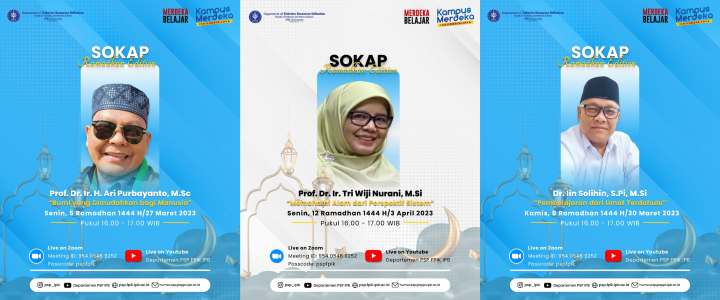Department of PSP FPIK IPB University Fills the Month of Ramadan by Studying Kauniyah Verses

The Department of Fisheries Resource Utilization (PSP), Faculty of Fisheries and Marine Science (FPIK) IPB University fills the holy month by holding Ramadan Talks. This activity is carried out in 8 series online via zoom, every Monday and Thursday afternoon before opening. Ramadan Talk is a study of Kauniyah verses.
In the first series of Ramadan Talks, Prof Ari Purbayanto explained the material 'The Earth is Easier for Humans and Other Living Things'. He quoted one of the letters in the Quran which states that the existence of the earth is intended for human needs.
"And We have spread out the earth and planted mountains on it and grow there everything according to measure," he said quoting Surah Al Hijr verse 19.
Prof Ari added, in several letters it has been explained that the ease given by Allah SWT is found both on land, sea, and the bowels of the earth. Forms of ease on land such as photosynthesis of plants that provide a source of oxygen for all living things.
"The ease in the sea is the existence of land and sea breezes that can be utilized by fishermen. From the bowels of the earth there is petroleum content that is beneficial to humans," he said. Prof. Ari emphasized that these conveniences must be balanced with human efforts to achieve happiness in the hereafter.
Meanwhile, Dr Iin Solihin in the second series delivered the material 'Lessons from Previous Ummah'. He said, the Quran is the best story. There are about 1,600 verses that convey historical stories, such as the stories of the prophets (Noah, Hud, Saleh, and other prophets), personal stories that are not prophets (Lukmanul Hakim, Maryam Ashabul Kahfi and Zulkarnain), as well as events during the Prophet's time (Uhud War, Hunain, Badr, as well as the War of Bani Nadhir and Isra Mi'raj).
"The story described in the Quran is divided into 4 characteristics. First, events that really happened. Second, stories that are in line with human life. Third, the previous stories can be a teaching for reasonable people. And fourth, the stories in the Quran are stories that are often repeated. The repetition of stories as wisdom to strengthen faith and broaden perspectives, "he said.
Dr Iin added, these stories can be used as teaching. The storytelling in the Quran is also intended to strengthen the heart and as a guide for believers in living life.
Meanwhile, the 3rd series of Ramadan Talks was presented by Prof Tri Wiji Nurani with the material 'Understanding Nature from a System Perspective'. According to him, there are three things that can be understood from the existence of the universe, namely the existence of purpose, interconnectedness and integration, and control.
"Allah SWT created the universe with a purpose, including in [QS. Ali Imron: 190-191], [QS. Al Ahqaf: 3], [QS. Ad Dukhan: 38-39], [QS. Az Zumar: 5] and [QS. Shad: 27]. The creation of the heavens and the earth and what is in between was created with the right purpose and in the specified time," he explained.
Prof Tri added that Allah SWT has created the universe in order. Allah SWT sends down rain and blows wind according to His command. Allah SWT also created the universe in an integrated manner. Allah SWT has created this universe for human life and various food sources are available on earth.
"The creation of the universe is done so that humans are grateful, but humans tend to make damage. Humans are given two choices as provisions to return to Him. Whoever does good deeds, it is for himself. Conversely, whoever does evil, it will be for himself," he concluded. (TWN/Rz) (IAAS/RUM)



